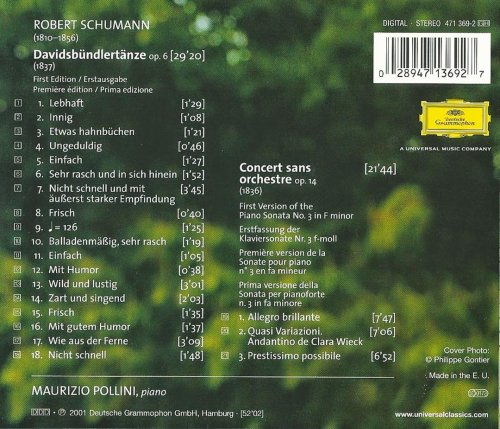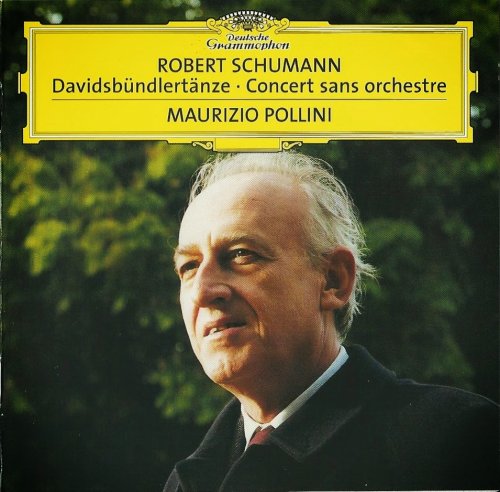
Maurizio Pollini - Schumann: Davidsbündlertänze, Concert sans orchestre (2001)
BAND/ARTIST: Maurizio Pollini
- Title: Schumann: Davidsbündlertänze, Concert sans orchestre
- Year Of Release: 2001
- Label: Deutsche Grammophon
- Genre: Classical
- Quality: FLAC (image+.cue,log,scans)
- Total Time: 52:02
- Total Size: 193 Mb
- WebSite: Album Preview
Tracklist:
Robert Schumann (1810-1856)
Davidsbündlertänze Op. 6 (First Edition (1837))
1. 1. Lebhaft 1:29
2. 2. Innig 1:08
3. 3. Etwas Hahbnbüchen 1:21
4. 4. Ungeduldig 0:46
5. 5. Einfach 1:27
6. 6. Sehr Rasch Und In Scih Hinein 1:52
7. 7. Nicht Schell Und Mit Äußerst Starker Empfindung 3:45
8. 8. Frisch 0:40
9. 9. ♩ = 126 1:25
10. 10. Balladenmäßig, Sehr Rasch 1:19
11. 11. Einfach 1:05
12. 12. Mit Humor 0:37
13. 13. Wild Und Lustig 3:01
14. 14. Zart Und Signend 2:03
15. 15. Frisch 1:35
16. 16. Mit Gutem Humor 1:37
17. 17. Wie Aus Der Ferne 3:09
18. 18. Nichte Schnell 1:48
Concert Sans Orchestre Op. 14 (First Version Of The Sonata No. 3 In F Minor)
19. 1. Allegro Brillante 7:47
20. 2. Quasi Variazioni. Andantino De Clara Wieck 7:06
21. 3. Prestissimo Possibile 6:52
Performers:
Maurizio Pollini - piano

Robert Schumann (1810-1856)
Davidsbündlertänze Op. 6 (First Edition (1837))
1. 1. Lebhaft 1:29
2. 2. Innig 1:08
3. 3. Etwas Hahbnbüchen 1:21
4. 4. Ungeduldig 0:46
5. 5. Einfach 1:27
6. 6. Sehr Rasch Und In Scih Hinein 1:52
7. 7. Nicht Schell Und Mit Äußerst Starker Empfindung 3:45
8. 8. Frisch 0:40
9. 9. ♩ = 126 1:25
10. 10. Balladenmäßig, Sehr Rasch 1:19
11. 11. Einfach 1:05
12. 12. Mit Humor 0:37
13. 13. Wild Und Lustig 3:01
14. 14. Zart Und Signend 2:03
15. 15. Frisch 1:35
16. 16. Mit Gutem Humor 1:37
17. 17. Wie Aus Der Ferne 3:09
18. 18. Nichte Schnell 1:48
Concert Sans Orchestre Op. 14 (First Version Of The Sonata No. 3 In F Minor)
19. 1. Allegro Brillante 7:47
20. 2. Quasi Variazioni. Andantino De Clara Wieck 7:06
21. 3. Prestissimo Possibile 6:52
Performers:
Maurizio Pollini - piano
This Robert Schumann pairing is perfectly representative of pianist Maurizio Pollini’s work: it’s both indisputably very good and yet lacks something. Pollini’s masterful technique fuses with his sense of professionalism, resulting in performances that are perfect yet lacking; lacking maybe enthusiasm, maybe passion, maybe idiosyncracy and personality. If this was repertory which was less played and hadn’t been done so brilliantly by other musicians, then Pollini’s release would be a state-of-the-art reference and we’d listen to it and be happy. But the two wonderful works performed here, “Davidsbundlertanze” (1837) and the Op. 14 Sonata (1835), have received terrific alternative interpretations. For both compositions, I can name recordings that leave me more inspired and excited than Pollini’s.
In the case of the Op. 14 Sonata, I’ll point you to Andras Schiff’s (done for ECM). This compact, dramatic, even abrupt work, has been somewhat overlooked over the years but I’m convinced it is one of Schumann’s boldest and most incisive efforts. The opening Allegro brillante almost erupts rather than just starting. Within 30 seconds, Schumann has transitioned into an almost declamatory contrasting theme that, after an impassioned melody high up, tumbles down in a cascading run. Pollini plays energetically enough, but his tempo is stiff and the downward cascading run doesn’t have the momentum Schiff gives it. I’ve isolated this one instance because it is an accurate illustration of what Pollini does throughout the entire disc. The brooding variations that form the central movement of the Sonata receive an unfortunate and carboardish reading from Pollini, while the final Prestissimo – seven minutes of music that returns to the opening Allegro’s terse energy – actually struck me as one of Pollini’s best tracks in this disc, with more energy and excitement than heard elsewhere. Pollini has traditionally hewed to strict tempi and a more detached style and this approach has certainly led to some inspired works – I include the brilliant Schumann Fantasy in C he recorded in the 1970s in this group – but the approach isn’t right in all contexts and I’m afraid his Op. 14 sonata is mixed, with some successful passages and others that are less so.
But this release has received attention for its acclaimed rendition of the “Davidsbundlertanze”. I compared Pollini’s recording with two excellent alternatives, the older Murray Perahia recording and the highly sensitive one from Boris Berezovsky. My bottom line is that the Pollini is basically a very good interpretation but doesn’t reach the heights or distinctiveness of either Perahia or Berezovsky. Pollini’s tendency towards woodenness is heard in the second piece from the suite, a bittersweet and precious melody tossed off in somewhat mechanical fashion by the Italian. Berezovsky has a notably limpid and beautiful take on this second piece. But Pollini does the short and simple fifth piece with grace and a nice flexibility. Pollini’s impressive technique helps him create an appropriately turbulent 6th piece but then he shifts back into an uninspired and pedestrian 7th piece, one where Perahia creates absolute magic with a slower tempo and a careful attention to the timbres created by Schumann’s exquisite piano writing. And so it goes – the 8th piece which follows is a delight. The rising-and-falling main section of the 13th piece “Wild und lustig” is great and then he segues into an uninspired and rather plain slow middle section. Some of the Davidsbundlertanze is terrific in Pollini’s hands; at other times, he goes through the motions. It’s off and on and off and on again...
Deutsche Grammophon has given Pollini a better recording than this label typically delivers. The piano sound is detailed and varied although there is too much bass rumble. I may have some reservations about Pollini’s work here, but it has strong points and in my experience marks one of the better discs of his later years. Do check out the alternatives I have mentioned above, but you will likely be pleased by this Pollini effort, so I’m giving it 5 stars.
In the case of the Op. 14 Sonata, I’ll point you to Andras Schiff’s (done for ECM). This compact, dramatic, even abrupt work, has been somewhat overlooked over the years but I’m convinced it is one of Schumann’s boldest and most incisive efforts. The opening Allegro brillante almost erupts rather than just starting. Within 30 seconds, Schumann has transitioned into an almost declamatory contrasting theme that, after an impassioned melody high up, tumbles down in a cascading run. Pollini plays energetically enough, but his tempo is stiff and the downward cascading run doesn’t have the momentum Schiff gives it. I’ve isolated this one instance because it is an accurate illustration of what Pollini does throughout the entire disc. The brooding variations that form the central movement of the Sonata receive an unfortunate and carboardish reading from Pollini, while the final Prestissimo – seven minutes of music that returns to the opening Allegro’s terse energy – actually struck me as one of Pollini’s best tracks in this disc, with more energy and excitement than heard elsewhere. Pollini has traditionally hewed to strict tempi and a more detached style and this approach has certainly led to some inspired works – I include the brilliant Schumann Fantasy in C he recorded in the 1970s in this group – but the approach isn’t right in all contexts and I’m afraid his Op. 14 sonata is mixed, with some successful passages and others that are less so.
But this release has received attention for its acclaimed rendition of the “Davidsbundlertanze”. I compared Pollini’s recording with two excellent alternatives, the older Murray Perahia recording and the highly sensitive one from Boris Berezovsky. My bottom line is that the Pollini is basically a very good interpretation but doesn’t reach the heights or distinctiveness of either Perahia or Berezovsky. Pollini’s tendency towards woodenness is heard in the second piece from the suite, a bittersweet and precious melody tossed off in somewhat mechanical fashion by the Italian. Berezovsky has a notably limpid and beautiful take on this second piece. But Pollini does the short and simple fifth piece with grace and a nice flexibility. Pollini’s impressive technique helps him create an appropriately turbulent 6th piece but then he shifts back into an uninspired and pedestrian 7th piece, one where Perahia creates absolute magic with a slower tempo and a careful attention to the timbres created by Schumann’s exquisite piano writing. And so it goes – the 8th piece which follows is a delight. The rising-and-falling main section of the 13th piece “Wild und lustig” is great and then he segues into an uninspired and rather plain slow middle section. Some of the Davidsbundlertanze is terrific in Pollini’s hands; at other times, he goes through the motions. It’s off and on and off and on again...
Deutsche Grammophon has given Pollini a better recording than this label typically delivers. The piano sound is detailed and varied although there is too much bass rumble. I may have some reservations about Pollini’s work here, but it has strong points and in my experience marks one of the better discs of his later years. Do check out the alternatives I have mentioned above, but you will likely be pleased by this Pollini effort, so I’m giving it 5 stars.

DOWNLOAD FROM ISRA.CLOUD
Maurizio Pollini Schumann Davidsbündlertänze Concert sans orchestre 01 1810.rar - 194.0 MB
Maurizio Pollini Schumann Davidsbündlertänze Concert sans orchestre 01 1810.rar - 194.0 MB
Classical | FLAC / APE | CD-Rip
As a ISRA.CLOUD's PREMIUM member you will have the following benefits:
- Unlimited high speed downloads
- Download directly without waiting time
- Unlimited parallel downloads
- Support for download accelerators
- No advertising
- Resume broken downloads


